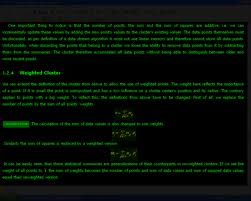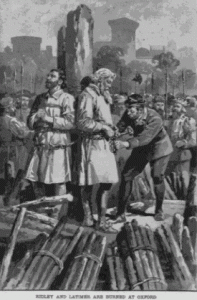====================
This sermon was preached on the Fifth Sunday after Epiphany, February 9, 2014, at St. Paul’s Episcopal Church, Medina, Ohio, where Fr. Funston is rector.
(The lessons for the day were: Isaiah 58:1-12; Psalm 112:1-10; 1 Corinthians 2:1-16; and Matthew 5:13-20. These lessons can be read at The Lectionary Page.)
====================
 Listen again to the words of the Prophet Isaiah:
Listen again to the words of the Prophet Isaiah:
Is not this the fast that I choose:
to loose the bonds of injustice,
to undo the thongs of the yoke,
to let the oppressed go free,
and to break every yoke?
Is it not to share your bread with the hungry,
and bring the homeless poor into your house;
when you see the naked, to cover them,
and not to hide yourself from your own kin?
Then your light shall break forth like the dawn,
and your healing shall spring up quickly;
your vindicator shall go before you,
the glory of the Lord shall be your rear guard.
Then you shall call, and the Lord will answer;
you shall cry for help, and he will say, Here I am.
If you remove the yoke from among you,
the pointing of the finger, the speaking of evil,
if you offer your food to the hungry
and satisfy the needs of the afflicted,
then your light shall rise in the darkness
and your gloom be like the noonday.
Listen again to the words of our Savior Jesus Christ:
You are the salt of the earth; but if salt has lost its taste, how can its saltiness be restored? It is no longer good for anything, but is thrown out and trampled under foot. You are the light of the world. A city built on a hill cannot be hid. No one after lighting a lamp puts it under the bushel basket, but on the lampstand, and it gives light to all in the house. In the same way, let your light shine before others, so that they may see your good works and give glory to your Father in heaven.
If you read my blog of meditations on the Daily Office readings which I post to the internet everyday and offer to this parish and to others through Facebook, you will already have read some of what I have to say this morning. This is because earlier this week the Daily Office lectionary included the story of the near-sacrifice of Isaac by his father Abraham, at the end of which, after Abraham has shown himself willing to do this humanly unthinkable thing at the command of God and thus demonstrated his faithfulness to God, the angel of the Lord addresses Abraham saying, “By your offspring shall all the nations of the earth gain blessing for themselves, because you have obeyed my voice.” It is the first mention in Scripture of the over-arching purpose of God’s People, the ministry that will be Israel’s and then will be the church’s: to be a source of blessing for all people, not just to be the recipients of blessing, but to be the source of blessing for all nations, to be (as Jesus says in this morning’s gospel) salt and light for the world.
This is and has always been the mission of God’s People; it is repeated again and again throughout the Old Testament. Isaiah prophesied to Israel that “in days to come the mountain of the Lord’s house shall be established as the highest of the mountains, and shall be raised above the hills; all the nations shall stream to it.” (Isa. 2:2) Psalm 72 includes the prayer for the king of Israel that all nations may be blessed in him (v. 17), and Psalm 87 proclaims that God will say of all people from every nation that “this one was born” in Zion (v. 6). Ben Sira refers to the promise to Abraham when he writes, “To Isaac also he gave the same assurance for the sake of his father Abraham. The blessing of all people and the covenant he made to rest on the head of Jacob.” (Ecclus. 44:22-23)
We were reminded last Sunday that this mission was inherited by Jesus when old Simeon took the infant Christ in his arms and proclaimed that he was to be “a light for revelation to the Gentiles and for glory to your people Israel.” (Lk 2:32) And now this week, as an adult rabbi, Jesus passes on that mission to his church, the new Israel (as St. Paul would later call it). Jesus instructs his disciples, those present at the Sermon on the Mount and all those to follow them through the ages, right down to you and me, to “let your light shine before others, so that they may see your good works and give glory to your Father in heaven.” (Mt 5:16) He has commissioned us to be “the salt of the earth” and “the light of the world,” and reminds us that “a city built on a hill cannot be hid.” (v. 14)
The Puritan preacher John Winthrop, who became governor of the Massachusetts Bay Colony, took up that image when he proclaimed the Puritan colonists’ covenant aboard the vessel Arbella in 1630; he admonished his band of pilgrims to set an example of righteousness for the world. He concluded a very long sermon with these words:
Now the only way . . . to provide for our posterity, is to follow the counsel of Micah, to do justly, to love mercy, to walk humbly with our God. For this end, we must be knit together, in this work, as one man. We must entertain each other in brotherly affection. We must be willing to abridge ourselves of our superfluities, for the supply of others’ necessities. We must uphold a familiar commerce together in all meekness, gentleness, patience, and liberality. We must delight in each other; make others’ conditions our own; rejoice together, mourn together, labor and suffer together, always having before our eyes our commission and community in the work, as members of the same body. So shall we keep the unity of the spirit in the bond of peace. The Lord will be our God, and delight to dwell among us, as His own people, and will command a blessing upon us in all our ways, so that we shall see much more of His wisdom, power, goodness, and truth, than formerly we have been acquainted with. We shall find that the God of Israel is among us, when ten of us shall be able to resist a thousand of our enemies; when He shall make us a praise and glory that men shall say of succeeding plantations, “may the Lord make it like that of New England.” For we must consider that we shall be as a city upon a hill. The eyes of all people are upon us. So that if we shall deal falsely with our God in this work we have undertaken, and so cause Him to withdraw His present help from us, we shall be made a story and a by-word through the world. We shall open the mouths of enemies to speak evil of the ways of God, and all professors for God’s sake. We shall shame the faces of many of God’s worthy servants, and cause their prayers to be turned into curses upon us till we be consumed out of the good land whither we are going.
And to shut this discourse with that exhortation of Moses, that faithful servant of the Lord, in his last farewell to Israel, Deut. 30. “Beloved, there is now set before us life and death, good and evil,” in that we are commanded this day to love the Lord our God, and to love one another, to walk in his ways and to keep his Commandments and his ordinance and his laws, and the articles of our Covenant with Him, that we may live and be multiplied, and that the Lord our God may bless us in the land whither we go to possess it. But if our hearts shall turn away, so that we will not obey, but shall be seduced, and worship other Gods, our pleasure and profits, and serve them; it is propounded unto us this day, we shall surely perish out of the good land whither we pass over this vast sea to possess it.
Therefore let us choose life,
that we and our seed may live,
by obeying His voice and cleaving to Him,
for He is our life and our prosperity.
Presidents John F. Kennedy and Ronald Reagan made use of the “city on the hill” metaphor in their inaugural addresses; Reagan conflated it with Jesus’ lamp on a lampstand by adding the adjective “shining” . . . America, said President Reagan, should be a “shining city on the hill.”
Now, I would be the last person to stand in a pulpit and tell you that I believe the United States of America was founded to be a “Christian nation.” I know my history far too well to offer that canard. America was not founded to be a Christian nation; it was founded to be a religiously free nation, a pluralist nation, a spiritually diverse nation. But America is a Christian majority country; it is a nation in which Christians have had influence; it is a nation in which Christians still have influence; and it is a nation in which Christians should act like Christians! It is we, the Christians — the followers of Jesus Christ — to whom Jesus gave the mission to be the “city on the hill,” to “let our light shine before others.”
Governor Winthrop, in his address to Puritan pilgrims, made reference to the Prophet Micah and made specific reference to that prophet’s proclamation: “[God] has told you, O mortal, what is good; and what does the Lord require of you but to do justice, and to love kindness, and to walk humbly with your God?” (Mic. 6:8) Isaiah’s prophecy read today puts flesh on the bones of Micah’s admonition: we do justice, love kindness, and walk with God when we feed the hungry, house the homeless, and clothe the naked.
We Episcopalians are pretty good at those material things. We run food pantries like our own Free Farmers’ Market. We run soup kitchens like the phenomenal ministry at Church of the Holy Apostles in New York City. We plant public gardens like our brothers and sisters at our own diocesan cathedral have done. We support shelters for the homeless and the abused, like our local Battered Women’s Shelter. We provide financial backing and volunteer labor to programs like Habitat for Humanity. Our own youth group and their adult supporters have traveled on mission trips to the Gulf Coast, to Appalachia, to central Pennsylvania, and to north-central Ohio to participate in housing improvement projects. We participate in Blanket Sunday programs to provide warm blankets and clothing to those in need. Our own knitting groups make shawls for the sick, and mittens, scarves, and woolen caps for merchant seamen. And we are just one of thousands of parishes around the country doing these things and many others.
We Episcopalians are pretty good, really, at the material mercies of feeding, housing, and clothing those in need.
But Isaiah didn’t stop fleshing out Micah’s call to justice, kindness, and humility with only those material ministries. He added that we have to “remove the yoke from among [us], the pointing of the finger, [and] the speaking of evil.” This is what Governor Winthrop was addressing when he said:
We must uphold a familiar commerce together in all meekness, gentleness, patience, and liberality. We must delight in each other; make others’ conditions our own; rejoice together, mourn together, labor and suffer together, always having before our eyes our commission and community in the work, as members of the same body. So shall we keep the unity of the spirit in the bond of peace.
I’m not so sure we Episcopalians . . . I’m not so sure that we mainstream American Christians of any denomination . . . have done such a good job in these areas.
Last Sunday was notable not only as the Feast of the Presentation, on which we heard that story of Simeon declaring the infant Jesus to be the light of the world, it was also Super Bowl Sunday. During the broadcast of that game, Coca-Cola offered an advertisement featuring several people of differing ethnicities singing in a variety of languages a rendition of the song America the Beautiful. It was, I thought, a lovely commercial. I enjoyed it. It reminded me of the same company’s ad from nearly 40 years ago when a crowd of folks on hillside proclaimed their desire to “teach the world to sing in perfect harmony.”
Apparently, however, there were others who saw the ad differently. Almost immediately after its showing, the internet social media was flooded with statements of outrage demanding that the Coca-Cola singers “speak American,” condemning the singing of “our national anthem” in any language other than English, and threatening a boycott of Coke. (As much as I might want to, I’m not going to address the issues that are raised by someone referring to the English language as “American” or by someone not knowing that America the Beautiful is not the national anthem of the United States.)
I must admit that I was both shocked and puzzled that people whom I believe would claim to be Christian, and who clearly claim to be Americans, would be upset with a successful American corporation advertising its product in a commercial in which people from all over the world extol the beauty of our country. The only explanation I can conceive is some sort of misunderstanding of what national unity is, and a misapprehension that uniformity of language promotes such unity. Indeed, that is the tenor of many remarks I’ve seen in the internet social media since the Super Bowl advertisement was aired. In many of those comments, the old image of America as a “melting pot” has been invoked.
Many of us may remember that image from grade school and junior high civics lessons; I remember a junior high school civics and history instructor who suggested another image. Our society is not and never has been a melting pot, he told us. A melting pot, he said, blends everything together. If our country was a melting pot, there wouldn’t be Hispanic barrios, black ghettos, Little Italies, Chinatowns, Levittowns, lace-curtain Irish neighborhoods, and all the other ethnic enclaves that have existed for decades and even centuries. We’re not a melting pot, he said. We are a tossed salad, a lively, tasty, vibrant, salty (to use Jesus’ metaphor) tossed salad. It is our diversity that makes us exciting and makes us strong, unity in diversity, not uniformity, which is what the critics of the Coca-Cola ad seem to want.
Ethnic diversity, however, is the biblical model. All the nations of the world receive a blessing through Abraham and his descendants, but they do not become Israel; they do not become Jews. Even as the nations stream to the mountain of God as Isaiah prophesied, even as God enrolls them as Psalm 87 describes declaring their birth in Zion, they remain Rahab, Babylon, Philistia, Tyre, Ethiopia, and all the other nations of the world. As immigrants come to be part of America, even as they may become naturalized citizens, they retain their histories and identities as Moroccan, Thai, Xosa, French, Maori, and all the rest, with cultural heritages to be honored, languages to be spoken and sung, and diversity to be celebrated. The shining city on the hill shines with diversity, the diversity shown in the Coke commercial!
I hope you saw the ad. I hope you enjoyed as much as I did. I hope you didn’t send any of those tweets and other messages condemning it and calling for people to “speak American.” I hope you didn’t receive any of those messages from acquaintances, but I have to tell you that I did. And I have to confess to you that it wasn’t until a few days later that I was able to reply to them. I have to confess to you that in failing to immediately respond and to gently rebuke, I failed to “remove the yoke from among [us], the pointing of the finger, [and] the speaking of evil.” I failed to “uphold a familiar commerce in meekness, gentleness, patience, and liberality.” I failed to “keep the unity of the spirit in the bond of peace.” And in that failure I allowed the bushel of hatred and malice to cover the light set upon the lampstand; I allowed the darkness of injustice and oppression to obscure the city on the hill.
And . . . I’m sorry to say . . . I don’t think I’m untypical as an Episcopalian, even as a mainstream American Christian. We are very good at the material ministries of food, housing, and clothing. Not so good at the spiritual ministries of unity and peace. We need to get better — I need to get better — at expressing the Christian faith in public. When someone tells a joke that is racist or sexist or homophobic, when someone makes a statement that demeans another, when someone speaks in any way that promotes injustice or oppression, we need — I need — to not be silent, but to respond immediately with “all meekness, gentleness, patience, and liberality.” Otherwise all of our material works of mercy, all the feeding, all the housing, all the clothing, will be obscured; the city on the hill will be hidden; our light will not shine for all to see; and none will glorify our Father in heaven.
Let us pray:
Grant, O God, that your holy and life-giving Spirit may so move every human heart and especially the hearts of Christian people throughout our country — especially our own hearts — that any barriers which divide us may crumble, suspicions disappear, and hatreds cease; that we recognize that diversity is not division and that unity does not require uniformity. Help us to confront injustice and oppression without hatred or bitterness, to struggle for justice and truth with gentleness and patience, and to work with everyone with forbearance and respect, that our city on the hill may not be obscured and that our light may shine before others so that they glorify you, our Father in heaven, through your Son, our Savior Jesus Christ. Amen.
====================
A request to my readers: I’m trying to build the readership of this blog and I’d very much appreciate your help in doing so. If you find something here that is of value, please share it with others. If you are on Facebook, “like” the posts on your page so others can see them. If you are following me on Twitter, please “retweet” the notices of these meditations. If you have a blog of your own, please include mine in your links (a favor I will gladly reciprocate). Many thanks!
====================
Father Funston is the rector of St. Paul’s Episcopal Church, Medina, Ohio.
 I’ve never quite understood the story of the tower of Babel. I get that it’s an etiological myth to explain the variety of languages spoken by human beings, but the picture of God that it paints is (shall we say?) less than positive. Might it have been better to cast someone else (say the Tempter?) as the “bad guy” who thwarts the plans of the tower builders?
I’ve never quite understood the story of the tower of Babel. I get that it’s an etiological myth to explain the variety of languages spoken by human beings, but the picture of God that it paints is (shall we say?) less than positive. Might it have been better to cast someone else (say the Tempter?) as the “bad guy” who thwarts the plans of the tower builders? I sometimes wonder to what extent Paul, as an educated Jewish citizen of a Greek-speaking empire, was schooled in the classical Greek philosophers. Had he read Plato’s Republic? Was he aware of the conversation portrayed in Book VII between Socrates and Glaucon in which the allegory of the cave is laid out?
I sometimes wonder to what extent Paul, as an educated Jewish citizen of a Greek-speaking empire, was schooled in the classical Greek philosophers. Had he read Plato’s Republic? Was he aware of the conversation portrayed in Book VII between Socrates and Glaucon in which the allegory of the cave is laid out? Very recently in the church office mail there was this small envelope addressed to me personally — the address has been typed out on a separate sheet of paper, cut therefrom, and glued onto the envelope. There is no return address and the postmark is a Cleveland, OH, cancelation. Inside there was no personal note of any kind, just a page torn from the last quarter’s Forward Day by Day devotional. One side, as you can see, has been scribbled all over; clearly not the side I am supposed to read. The other is the meditation for October 30, 2013, which begins:
Very recently in the church office mail there was this small envelope addressed to me personally — the address has been typed out on a separate sheet of paper, cut therefrom, and glued onto the envelope. There is no return address and the postmark is a Cleveland, OH, cancelation. Inside there was no personal note of any kind, just a page torn from the last quarter’s Forward Day by Day devotional. One side, as you can see, has been scribbled all over; clearly not the side I am supposed to read. The other is the meditation for October 30, 2013, which begins: I bring you greetings from the people of St. Paul’s Parish, Medina, Ohio, where I am privileged to serve as rector. Nearly all the active members of our congregation know and respect Patrick, and have asked me to convey their congratulations to him and to you, together with the assurance of their prayers, as you continue together in a new ministry only recently begun. Of course, none of them know Sandy, but we offer our greetings and prayers for her diaconal ministry among you, as well.
I bring you greetings from the people of St. Paul’s Parish, Medina, Ohio, where I am privileged to serve as rector. Nearly all the active members of our congregation know and respect Patrick, and have asked me to convey their congratulations to him and to you, together with the assurance of their prayers, as you continue together in a new ministry only recently begun. Of course, none of them know Sandy, but we offer our greetings and prayers for her diaconal ministry among you, as well. In the original Star Trek series, the crew’s uniforms were color coded: gold uniforms were command; red uniforms were engineering and security; and blue uniforms were science and medical. Parish ministry entails all three. So, Patrick, I have a little gift for you — a set of three pairs of official Star Trek color-coded uniform socks to remind you of these aspects of pastoral ministry.
In the original Star Trek series, the crew’s uniforms were color coded: gold uniforms were command; red uniforms were engineering and security; and blue uniforms were science and medical. Parish ministry entails all three. So, Patrick, I have a little gift for you — a set of three pairs of official Star Trek color-coded uniform socks to remind you of these aspects of pastoral ministry. Which brings us, at last, to the blue uniforms, the science and medical corps of the star ship. Mr. Spock the Science officer and Doctor “Bones” McCoy always wore blue. One of the ancient terms that we still use for pastoral ministry is “the cure of souls,” the word “cure” having pretty much the same meaning as it has in medicine. Broadly speaking, this ministry is the care, protection, and oversight of the nourishment and spiritual well-being of the souls committed to the pastor’s care; it may be shared with others, with deacons or with lay ministers, but it is truly the ministry of the parish priest. It is in this “blue shirt” ministry that those wonderful, painful, joyful, intimate moments of grace that I spoke of earlier will happen.
Which brings us, at last, to the blue uniforms, the science and medical corps of the star ship. Mr. Spock the Science officer and Doctor “Bones” McCoy always wore blue. One of the ancient terms that we still use for pastoral ministry is “the cure of souls,” the word “cure” having pretty much the same meaning as it has in medicine. Broadly speaking, this ministry is the care, protection, and oversight of the nourishment and spiritual well-being of the souls committed to the pastor’s care; it may be shared with others, with deacons or with lay ministers, but it is truly the ministry of the parish priest. It is in this “blue shirt” ministry that those wonderful, painful, joyful, intimate moments of grace that I spoke of earlier will happen. Independence Day is one of the few secular holidays to have lessons of its own in both the Eucharistic and Daily Office Lectionaries of the Episcopal Church. There is a set of lessons in the regular Daily Office schedule of readings for today, as well, and I am intrigued that the way the calendar falls this year the Gospel for that set is the unjust trial of Jesus. One could meditate for hours on the meaning to be drawn from that juxtaposition.
Independence Day is one of the few secular holidays to have lessons of its own in both the Eucharistic and Daily Office Lectionaries of the Episcopal Church. There is a set of lessons in the regular Daily Office schedule of readings for today, as well, and I am intrigued that the way the calendar falls this year the Gospel for that set is the unjust trial of Jesus. One could meditate for hours on the meaning to be drawn from that juxtaposition. Are you familiar with those visions of the afterlife in which the dearly departed, clothed in flowing white robes lounge around on fluffy, white cotton clouds playing harps? I have to be honest with you that I cherish a very dear hope that such visions are 100% absolutely wrong! I cannot imagine any existence more boring than an eternity of cloud-floating and harp-playing, and if my ten years of knowing Charlie Stehno have given me a clue of anything about Charlie it is that he would most likely feel the same way. If he has gotten to the Great Hereafter only to find himself fitted out with a flowing white robe and issued a harp to play and cloud to lounge upon, I suspect that he is (as my grandmother would say) “fit to be tied.”
Are you familiar with those visions of the afterlife in which the dearly departed, clothed in flowing white robes lounge around on fluffy, white cotton clouds playing harps? I have to be honest with you that I cherish a very dear hope that such visions are 100% absolutely wrong! I cannot imagine any existence more boring than an eternity of cloud-floating and harp-playing, and if my ten years of knowing Charlie Stehno have given me a clue of anything about Charlie it is that he would most likely feel the same way. If he has gotten to the Great Hereafter only to find himself fitted out with a flowing white robe and issued a harp to play and cloud to lounge upon, I suspect that he is (as my grandmother would say) “fit to be tied.” Today, it is the evening psalm that I ponder.
Today, it is the evening psalm that I ponder. Three words come to mind as I read Paul’s question: indecision, duplicity, and dialectic. Each could be described as “saying ‘Yes, yes’ and ‘No, no’ at the same time.”
Three words come to mind as I read Paul’s question: indecision, duplicity, and dialectic. Each could be described as “saying ‘Yes, yes’ and ‘No, no’ at the same time.” Leslie Dixon Weatherhead (1893-1976) was an English Methodist Minister who served at the City Temple, a Congregational Church in London. He served there from 1936 until his retirement in 1960. In one of his several book, The Christian Agnostic, he wrote, “When people said to me, ‘I should like to be a member of the City Temple, what must I believe?’ I used to say, ‘Only those things which appear to you to be true.’”
Leslie Dixon Weatherhead (1893-1976) was an English Methodist Minister who served at the City Temple, a Congregational Church in London. He served there from 1936 until his retirement in 1960. In one of his several book, The Christian Agnostic, he wrote, “When people said to me, ‘I should like to be a member of the City Temple, what must I believe?’ I used to say, ‘Only those things which appear to you to be true.’”

